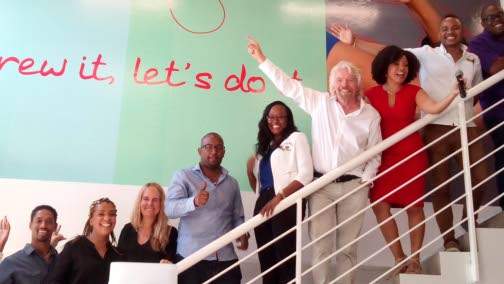Richard Branson, founder of the Branson Centre of Entrepreneurship (third from right), poses with Lisandra Rickarts, CEO of the Branson Centre (second from right) and the 8th Cohort of Scale Up Entreprenuers on the staircase. at the Branson Centre in Liguanea, Kingston, on Tuesday.
During a brief visit to the Branson Centre of Entrepreneurship, its founder Sir Richard Branson reiterated his commitment to assist in building the economies of the Caribbean by supporting entrepreneurs.
“The accelerator programme is what we at the Branson Centre will use to get the entrepreneurs in the Caribbean going forward.” Branson congratulated the Lissandra Rickarts-led team at the Branson Centre who has led the flagship programme in Jamaica, and includes other regions such as the British Virgin Islands and other Caribbean islands.
Recently, the Branson Centre announced that it would focus on scale-ups and not start-ups. That does leave a gap for training that the Small Business Association of Jamaica has committed to take up in terms of helping start-ups become scale-ups.
Rickards previously stated, “We do a lot of tracking and analysis here at the Centre, and based on our monitoring and evaluation reports, we realised that we could increase our impact by supporting entrepreneurs ready to scale in this way in order to remain committed to our mission ‘To create dynamic economies’.”
According to experts, the required skill set and focus of a company’s leadership shifts dramatically between a company’s start-up and scale-up phases. Recode.com outlines a few key examples:
Specialising: In a start-up, there’s an early bias towards hiring “full stack” employees that are generalists. They can achieve a lot with a little, and they allow the business to get started and keep growing with a smaller team. As the organisation grows, however, one person can no longer do it all, or do it as well as a specialist. This can spell a tricky time for a business. Shifting generalists to a narrower focus or bringing in a team to sit beneath generalists can be an adjustment, but it’s one of the growing pains involved in transitioning from start-up to scale-up.
Risk-averting: As a start-up, your customer base is small, and you haven’t proven your model yet. You aren’t worried about messing up a status quo because you haven’t settled into one yet. Since you’re focused on taking risks that could lead to the perfect “Bingo!” moment, consistency isn’t exactly king (or queen). That will shift gradually and increasingly as your customer base grows, and your growing team will require more support from operations, technical and customer service. As a company scales up in size, the previous trial and error allows a more thorough knowledge of what works and what doesn’t; however, with that comes a smaller window for experimentation in your business model.




Leave A Comment